Objects Κέντρον Ερεύνης Ελληνικής Φιλοσοφίας
<< 10
10 >>
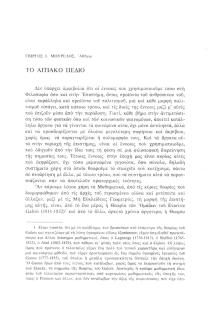
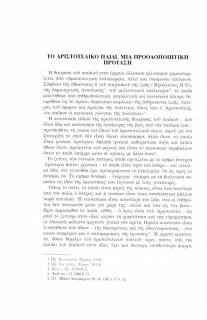
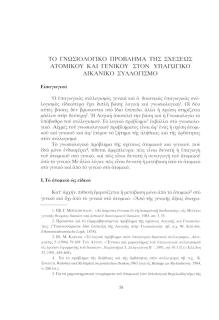
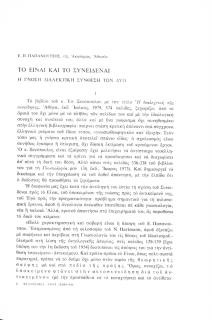
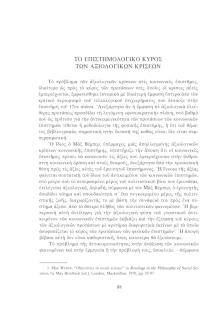
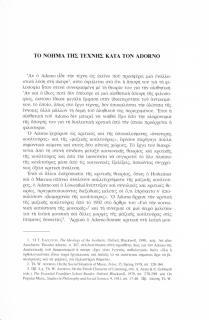
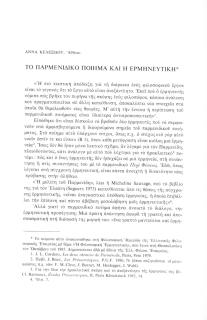
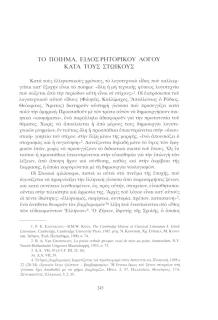
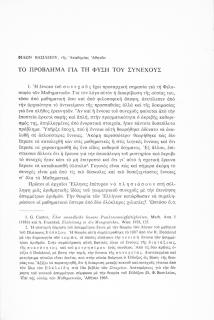
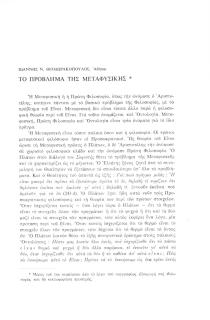
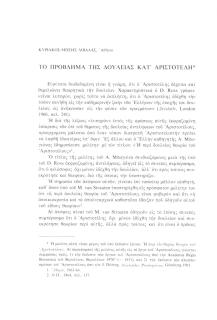
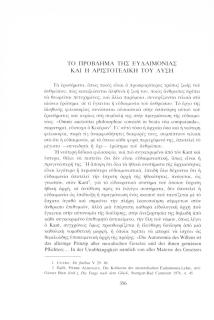 << 10
10 >>
<< 10
10 >>
Total: 4244

Το αιτιακό πεδίο
Ενότητα: Άρθρα του περιοδικού "Φιλοσοφία"
L΄idée de causalité a une longue histoire depuis l΄Antiquité grecque où Aristote par sa théorie des quatre causes a tranché sur ses prédécesseurs et en a fourni un modèle qui embrasse dans un même ensemble causalité et finalité. De ses quatre causes: cause formelle, cause matérielle, cause efficiente et cause finale, le seul type de causalité qui a prévalu dans les sciences physiques, à partir de la Rennaissance, a été la cause efficiente. De cette causalité Descartes a élaboré le modèle mécanique, l΄état actuel de l΄univers étant expliqué par lui comme le produit d΄une suite de mouvements à partir d΄une matière initiale, ce qui implique que c΄est grâce au mouvement que la cause produit l΄effet. C΄est à la base de ces considérations mécanistes que Laplace a formulé sa conception du déterminisme universel. Il est vrai que Newton semble avoir renoncé à expliquer la gravitation par la recherche des causes qui la produisent. Dans son fameux scholis qui accompagne la deuxième édition des Principia mathematica philosophiae naturalis, où il prés...
Το αριστοτελικό παιδί. Μια προοδοποιητική πρόταση
Ενότητα: Άρθρα του περιοδικού "Φιλοσοφία"
Δεν υπάρχει περιγραφή
Το γνωσιολογικό πρόβλημα της σχέσεως ατομικού και γενικού στον υπαγωγικό δικανικό συλλογισμό
Ενότητα: Άρθρα του περιοδικού "Φιλοσοφία"
Das erkenntnistheoretische Problem des Verhältnisses von Individuellem und Allgemeinem bei der juristischen Subsumtion stellt sich zweiseitig: Wie ist der Übergang vom Individuellen zum Allgemeinen und - umgekehrt - vom Allgemeinen zum Individuellen möglich? I. Als möglich erscheint zunächst nur der Übergang vom Individuellen zum Allgemeinen und nicht vom Allgemeinen zum Individuellen; denn die Individualität, als absolute Individualität gemeint, ist etwas Irrationales, sie entzieht sich der ratio und ist nur durch Anschauung erfaßbar, kann nicht begriffen, sondern nur intuitiv verstanden werden. Die ratio kann nicht das absolut Individuelle, sondern nur das relativ Individuelle begreifen; relativ Individuelles ist das Typische, das Spezifische, nämlich der Inbegriff der allgemeinen Merkmale, die dem praktischen Verstand als representativ für eine Reihe von Objekten erscheinen, ohne daß sie zugleich allen Vertretern der betreffenden Gattung gemeinsam sein müßten. Im Bereich des Rechts ist die Individualisierung immer nur relativ; sie reic...
Το είναι και το συνειδέναι. Η γνώση διαλεκτική σύνδεση των δύο
Ενότητα: Άρθρα του περιοδικού "Φιλοσοφία"
In this article the author gives an answer to the comment of a critic of his book «Gnosiologia», Athens 19733 (English edition: The Foundations of Knowledge, edited with an Introduction by J. P. Anton, translated by B. Coukis-J. P. Anton, Albany-New York, State University of New York Press 1968, 317 pp.), which questions the bilateral interconnection between Being and Consciousness within the act of knowing. According to the critic, whereas Consciousness is dependent on Being and subject to its indications and restrictions, Being (i.e. all sorts of reality which become objects of knowledge) is self-existent, independent and by-itself, indifferent to the approaches of Consciousness. This thesis is countered by the author with a series of arguments based on theory and on practice (and, in the last part of the article, with concrete examples drawn from scientific ontology) in order to demonstrate the position maintained in «Gnosiologia». Reality, that is, is grasped by the mind if and to the extent that it becomes known not by the layman (th...
Το επιστημολογικό κύρος των αξιολογικών κρίσεων
Ενότητα: Άρθρα του περιοδικού "Φιλοσοφία"
In this paper an attempt is being made to examine the epistemology of the value judgements and propositions of the social sciences in particular in comparison to that of the sciences of nature. In the degree to which the value element is a substantive and constitutive part of social action and of social institutions, such an element definitely enters into the formulation of social action propositions, the tendency to challenge the objectivity of such propositions and to consider them as wrong ones is erroneous. In addition, in the degree to which the value judgement in social science΄s propositions is indispensable, there also emerged the impossibility for their definitely classification as either false or true. Within such a frame of analysis, we cannot claim that something is false unless we possess that which is true, and therefore, the distorted or ideological nature of knowledge (which the sociology of knowl¬edge proclaims) seems to be meaningless. Within a probability frame of reference, the degree to which causal inferences could be...
Το νόημα της Τέχνης κατά τον Adorno
Ενότητα: Άρθρα του περιοδικού "Φιλοσοφία"
The fundamental theme of Adorno΄s theory of aesthetics is the autonomy of art. In his recent work, Aesthetic Theory, in the sections that he deals with the dual essence of art - as autonomous and social fact - we see that he rejects the idea of engaged art. Adorno΄s criticism of engaged art is clearly not a refusal of the political but rather a complaint that the self-appointed political literature undercuts its own political strength because of its refusal of aesthetic autonomy. Moreover, part of the problem is that Adorno makes a rather rigid distinction between «authentic» art and mass culture. Although he recognized that high art and popular culture are both socially mediated by capitalism, he argues that the former is autonomous while the latter, as part of the industrial processes of mass production and consumption within contemporary capitalism, contributes in turn to processes of homogenization and massification of both culture and audiencies.
Το παρμενιδικό ποιήμα και η ερμηνευτική
Ενότητα: Άρθρα του περιοδικού "Φιλοσοφία"
Δεν υπάρχει περιγραφή
Το ποίημα είδος ρητορικού λόγου κατά τους Στωικούς
Ενότητα: Άρθρα του περιοδικού "Φιλοσοφία"
Toujours sensibles à la protection de la langue grecque des influences étrangères (barbarismes), les Stoïciens visent à l΄harmonie et à la clarté de cette langue. Dans la même perspective, les trois représentants de l΄ancien stoïcisme: Zénon, Cléanthe et Chrysippe, ont écrit de nombreux traités de grammaire, de rhétorique et de poétique. Selon les philosophes du Portique, le sage, ayant acquis la maîtrise de tous les arts, et, en conséquence, de l΄art poétique, est capable de composer des poèmes; son but consiste à attirer son auditoire et à le conduire à la vertu dont le germe existe chez l΄homme. Or le sage, dans la Cité stoïcienne, doit enseigner, παιδεύειν, le public. Étant semblable au dieu, il se trouve en rapport avec lui, à travers le Logos. Dans ce cas, le poème fonctionne comme un discours rhétorique. Le poète a recours aux mythes et aux traditions du peuple grec, aux chants homériques et à la poésie d΄Hésiode, pour y puiser des sujets chers à l΄homme de l΄époque hellénistique, qui cherche à s΄incorporer dans le cadre plus large ...
Το πρόβλημα για τη φύση του συνεχούς
Ενότητα: Άρθρα του περιοδικού "Φιλοσοφία"
It is well known that continuity has a primary importance for the Philosophy of Mathematics. That is why the investigation into the nature of the continuum has been the object of constant effort and trial for many scientists since antiquity. Although this concept is intuitively very clear and simple, its exact definition, without any intuitive elements, always constituted a very difficult problem. It seemed impossible to most ancient philosophers to analyse this notion into more elementary ones. Nor did others think continuity was a logical or mathematical idea, but rather a pure dogma. As a matter of fact, Greek mathematicians succeeded in approaching the geometrical conception of the continuum through an arithmetical one, by means of the invention of incommensurable numbers. This greek theory could hardly be completed in two thousand of years. What recent mathematicians did, was a representation of the geometrical continuum merely. Thus, the class of all real numbers constituted the linear continuum of Geometry. Later on, by the inventi...
Το πρόβλημα της Μεταφυσικής
Ενότητα: Άρθρα του περιοδικού "Φιλοσοφία"
Die Metaphysik, die genauso alt wie die Philosophie ist, begleitet seit ihrer Entstehung die Frage, ob sie als Wissenschaft möglich ist. Diese InFrage-Stellung kommt erstens vom Empirismus und Posivitismus her, zweitens von der Sprachphilosophie und drittens von der Richtung, die das Seinsproblem geschichtlich untersucht. Der Positivismus von Auguste Comte in seiner Drei-Stadien-Lehre, der ihn später zugunsten des theologischen Stadiums aufgibt, beschränkt die Philosophie auf das Diesseits, indem er nur empirische Aussagen über die Phänomene und deren wechselseitige Bedingtheit zuläßt, ohne nach ansich-seienden Gründen hinter ihnen Ausschau zu halten. Damit widerspricht er als dogmatische Lehre seinem eigenen Ansatz, weil er relative Aussagen absolut setzt. Darüber hinaus zerreißt er die Sphäre der Empirie, weil er zu den empirischen Aussagen auch die logischen und die mathematischen nehmen muß, deren Gültigkeit die Grenzen der Empirie übersteigt. Die zweite Gruppe der antimetaphysischen Argumente vertritt Ludwig Wittgenstein. In seinem ...
Το πρόβλημα της δουλείας κατ' Αριστοτέλη
Ενότητα: Άρθρα του περιοδικού "Φιλοσοφία"
L΄étude a pour objectif de montrer l΄erreur foncière de l΄opinion courante, selon laquelle Aristote fut le doctrinaire de l΄esclavage comme institution juridique. Fondée sur une utilisation exhaustive et une interprétation serrée des passages du Corpus Aristoteltcum concernant son sujet, elle comprend trois parties. Dans la première partie est présenté le sens, très large, auquel Platon et Aristote emploient le mot «esclave», pour désigner surtout une attitude ou une qualité de caractère moral. Chez Platon, par exemple, est employé le mot «esclave» comme une expression adéquate, fût-ce par métaphore, de la soumission du corps à l΄âme, des gouvernants aux lois, voire de l΄homme à Dieu; par Aristote la qualification «esclave par nature» est attribuée à l΄homme qui a une infirmité mentale héréditaire. Dans la deuxième partie est opérée l΄interprétation du mot «nature» de l΄expression aristotélicienne «esclave par nature». Dans ce but sont évoquées les doctrines d΄ Aristote concernant les rapports entre nature et art, de même qu΄entre forme ...

